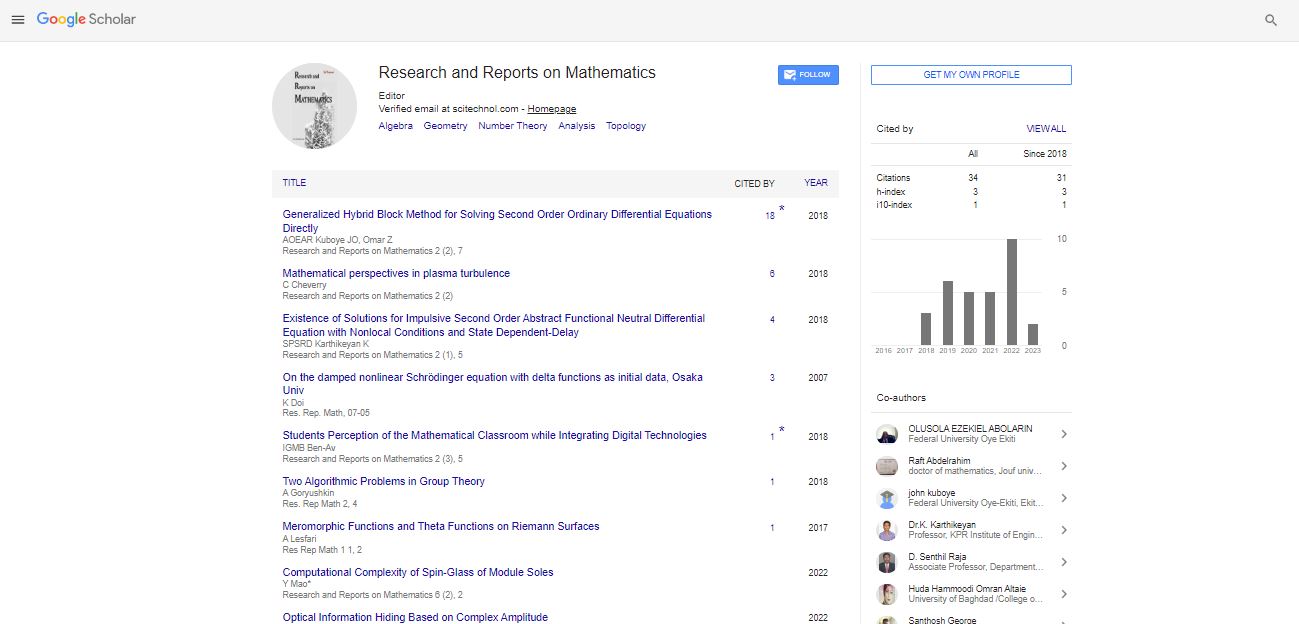Opinion Article, Res Rep Math Vol: 7 Issue: 4
Advanced Algebraic Methods in Statistics
Christoph Woike*
1Department of Mathematics, University of Hamburg, Hamburg, Germany
*Corresponding Author: Christoph Woike,
Department of Mathematics, University
of Hamburg, Hamburg, Germany
E-mail: christoph.woike.uh@edu.de
Received date: 28 July, 2023, Manuscript No. RRM-23-113478;
Editor assigned date: 30 July, 2023, Pre QC No. RRM-23-113478 (PQ);
Reviewed date: 14 August, 2023, QC No. RRM-23-113478;
Revised date: 23 August, 2023, Manuscript No. RRM-23-113478 (R);
Published date: 31 August, 2023, DOI: 07.4172/rrm.10001202
Citation: Woike C (2023) Advanced Algebraic Methods in Statistics. Res Rep Math 7: 4 .
Description
Statistics, as a cornerstone of data science, is the science of collecting, analyzing, interpreting, presenting, and organizing data. It plays a pivotal role in decision-making across various fields, from science and engineering to social sciences and economics. Advanced algebraic methods in statistics represent a powerful set of techniques that enhance our ability to model complex phenomena, make predictions, and derive valuable insights from data. In this exposition, the world of advanced algebraic methods in statistics, shedding light on their significance, core concepts, and practical applications will be discussed. At its core, statistics is fundamentally intertwined with mathematics, particularly algebra. Algebra provides the language and tools necessary for formulating statistical models, solving equations, and deriving meaningful conclusions from data. Here's how algebra underpins statistics. Statistical models are mathematical representations of real-world phenomena. They involve equations, functions, and algebraic structures to describe relationships between variables. For example, linear regression models are based on algebraic equations that relate independent and dependent variables.
Algebraic methods are employed to estimate parameters in statistical models. Maximum likelihood estimation, a fundamental statistical technique, relies on algebraic manipulations to find the values of parameters that make the observed data most probable. Algebraic reasoning is central to hypothesis testing, a key component of statistical analysis. Hypothesis tests involve algebraic operations to compare observed data with expected outcomes under a null hypothesis.
While elementary algebra is essential in statistics, advanced algebraic methods provide more sophisticated tools for tackling complex problems. Here are some advanced algebraic methods frequently used in statistics. Matrices and linear algebra are indispensable in multivariate statistics. Covariance matrices, factor analysis, and principal component analysis all rely heavily on matrix algebra. It enables statisticians to work with high-dimensional data efficiently. Calculus, including differentiation and integration, is essential for advanced statistical modeling. Optimization techniques, rooted in calculus and algebra, are used to find model parameters that minimize error or maximize likelihood. Eigenvalues and eigenvectors play a pivotal role in spectral analysis and dimensionality reduction techniques like Principal Component Analysis (PCA). They help transform data into a new coordinate system, simplifying complex datasets.
In modern data analysis, higher-order data structures, such as tensors, are increasingly encountered. Tensor decomposition methods, akin to matrix factorization, employ advanced algebraic concepts to extract meaningful patterns and structures from these data types. Group theory, a branch of abstract algebra, is applied in experimental design and combinatorial statistics. It helps identify symmetries and patterns in experimental setups, which can aid in the design and analysis of experiments. Algebraic statistics is an emerging field that combines algebraic geometry, commutative algebra, and statistics. It deals with problems like statistical modeling of algebraic varieties and applications in phylogenetic and Bayesian networks.
Advanced algebraic methods in statistics find applications across various domains, revolutionizing the way data is analyzed and interpreted, many machine learning algorithms, such as support vector machines and neural networks, have algebraic underpinnings. Linear algebra and optimization techniques are fundamental to training these models. Advanced algebraic methods are used in signal processing to extract features and patterns from signals, such as audio and image data. Techniques like Fourier analysis rely on algebraic concepts. Financial modeling and risk assessment heavily depend on algebraic methods. Portfolio optimization, option pricing models, and risk management all use advanced algebraic techniques. Genomic data analysis involves complex algebraic methods to identify genetic patterns, clusters, and associations, aiding in disease diagnosis and treatment. Algebraic methods are applied to solve complex equations and model physical systems in fields like quantum mechanics, fluid dynamics, and electrical engineering. Statistical models in psychology, sociology, and political science often incorporate advanced algebraic methods to understand complex human behaviors and social interactions.
While advanced algebraic methods have significantly expanded the toolkit of statisticians, challenges remain, some advanced methods involve computationally intensive operations, requiring efficient algorithms and high-performance computing. Utilizing these methods effectively often requires interdisciplinary collaboration between statisticians and domain experts. Continuing to develop algorithms that harness advanced algebraic techniques for big data and complex models is an ongoing challenge. Advanced algebraic methods in statistics serve as a bridge between theory and practice, enabling statisticians and data scientists to unlock deeper insights from data across diverse fields. Whether through matrix algebra, calculus, or group theory, these methods empower researchers to model complex systems, make informed decisions, and advance knowledge in their respective domains. As data continues to grow in complexity and volume, the role of advanced algebraic methods in statistics will only become more central to scientific and technological progress.
 Spanish
Spanish  Chinese
Chinese  Russian
Russian  German
German  French
French  Japanese
Japanese  Portuguese
Portuguese  Hindi
Hindi 